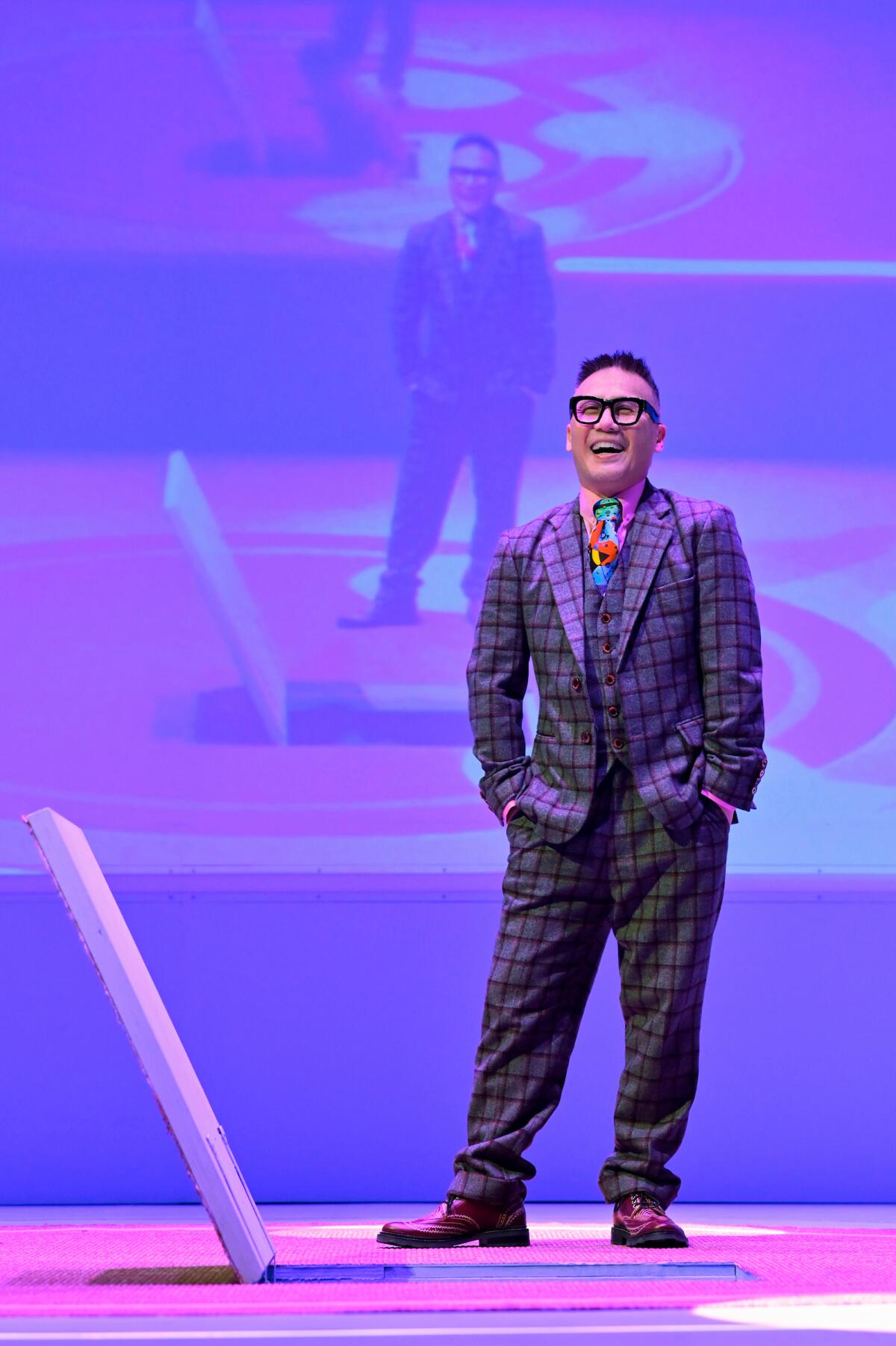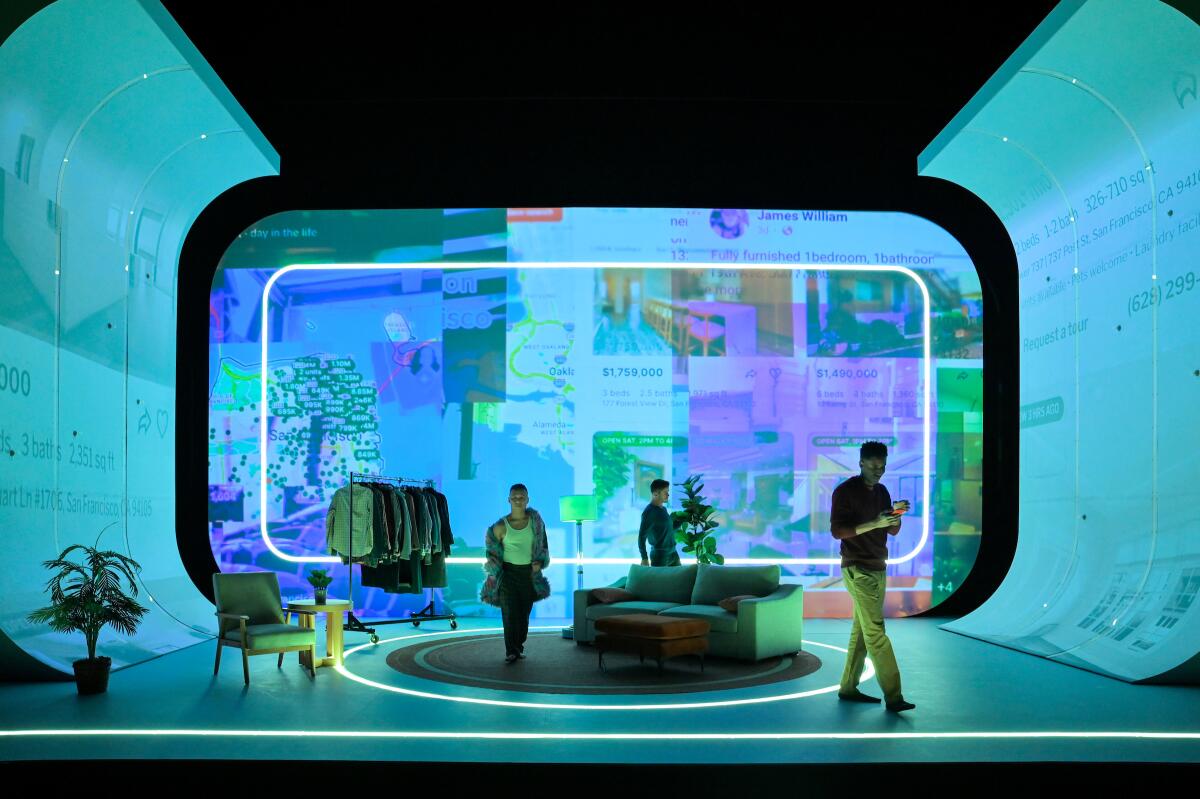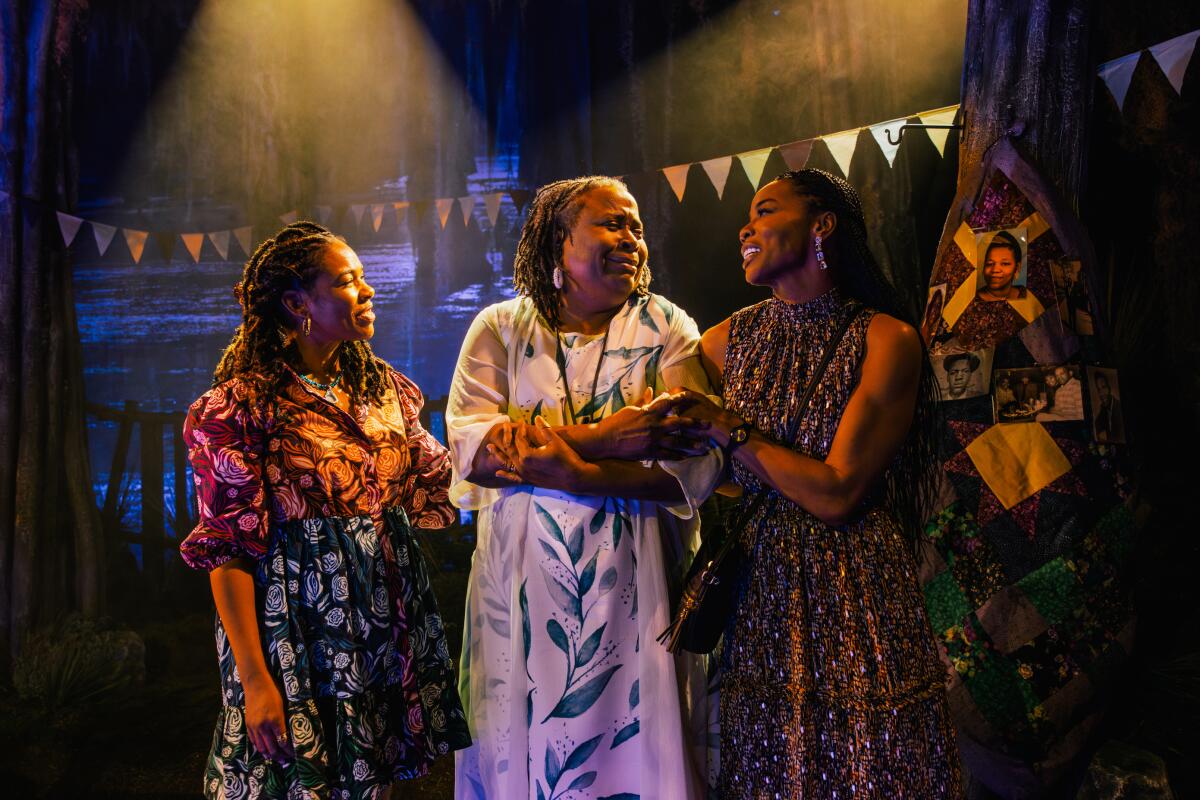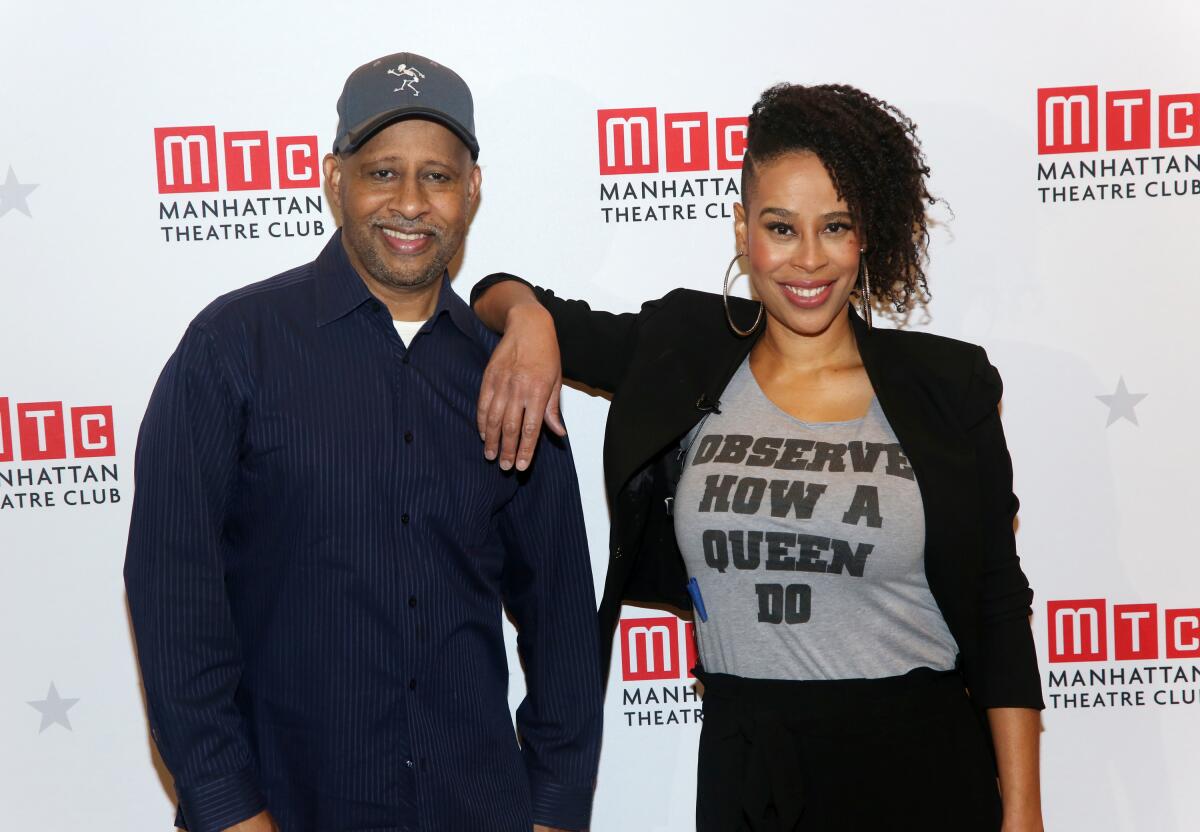A Bay Area play posits the dangers of tech. The playwright wants its makers to see it

- Share via
Full disclosure: I used numerous technological devices to build this newsletter spotlighting a new play about our use of technological devices. I’m entertainment reporter Ashley Lee, filling in this week for Carolina A. Miranda and bringing you the latest essential arts news:
The download on ‘Big Data’
In “Big Data,” an intriguing world premiere at San Francisco’s American Conservatory Theater, BD Wong dons notably playful attire — a vibrant patterned tie, a cerulean fur coat, a onesie covered in cartoonish lightning bolts — to play M, a lively personification of the technology we use regularly.
“He even says in the play that he can be helpful, but he can also be very entertaining,” he told The Times this week. “It’s this throwaway line that gets a laugh, but it really sets the tone. Yes, tech is all wires and metal and diodes, but we all have this relationship to it that we don’t really think about because it’s so eye-catching and diverting.”
Kate Attwell realized this colorful characterization upon visiting Mozilla and Tactical Tech’s pop-up “The Glass Room,” housed by a Market Street storefront in late 2019.
“It was dealing with the issues around surveillance data not in a big societal fashion, which is extremely important, but in a personal and individual way,” the playwright explained. “It managed to point out the ways in which the amount of seemingly meaningless data we give away on a daily basis actually accumulates into a pretty robust picture of ourselves — who we are and what we care about — and all of the questions that then brings up when it gets so tied to capitalism.”
You’re reading Essential Arts
Our critics and reporters guide you through events and happenings of L.A.
You may occasionally receive promotional content from the Los Angeles Times.
Throughout the play, the beguiling M interacts with members of a family as they go about their lives. “All the other characters are bouncing their anxieties and their wishes off of him, one way or another,” said Wong of M, who shape-shifts to meet their respective needs and influence their innermost impulses.
“Because of how insidious this tech can be, we don’t make decisions in the same way anymore,” he said. “That’s not necessarily bad, but it is less natural because it can make you think things that you might not think otherwise.”
Wong considers the first act of “Big Data” to be a comedy; in the second act, “the play turns on you, which I think is indicative of the complexity of this subject matter, and how it can turn from funny to almost dark or upsetting that quickly,” he said. “So while we can embrace and enjoy all the wonderful things we can do now that we couldn’t do before, we mustn’t forget that everything comes with a price.”
The play’s development has required plenty of tweaking to keep up with the real world’s ever-evolving discourse around emerging technologies. “We neither wanted to be behind the curve as ChatGPT became a friend, nor did we want to get too ahead of the curve, as if this felt like science fiction about a dystopian future,” said A.C.T. Artistic Director Pam MacKinnon. “This play is the present-tense wrestling with it all, in very human terms. These conversations are happening not just on this stage, but also in our living rooms and also in corner offices.”

Running through March 10, “Big Data” is “one of the Bay Area’s most promising world premieres in recent memory,” wrote San Francisco Chronicle critic Lily Janiak in her review. And it’s especially fitting that the play is premiering in a region dominated by the tech industry; in fact, the creatives hope it speaks directly to those whose work is the subject of the characters’ debate.
“San Francisco is the place of so much innovation around all of these objects, but that means it’s a place of radical thinking,” Attwell said. “And there are also a lot of people here who are at the forefront of considering the ethical questions around it all. The play is not standing on a high horse, it’s not scolding anyone. It’s posing questions about how we exist in the world with this technology.”
“Audiences love to see themselves reflected back from the stage,” added MacKinnon, who also directs the play. “Even if they’re being critiqued, and maybe even especially if they’re being critiqued, people love that feeling that a piece of art is taking them seriously.”
Across the arts
Geffen Playhouse’s intimate Audrey Skirball Kenis Theater has been transformed into marshy Texas woods for the world premiere of Kristen Adele Calhoun’s “Black Cypress Bayou.” Directed by Tiffany Nichole Greene and featuring an ensemble led by “P-Valley” star Brandee Evans, the suspenseful comedy kicks off when a family of Black women finds themselves surrounding the dead body of the one of the richest white men in the state.
“Neither the play nor the production feels completely settled at this point,” wrote Times theater critic Charles McNulty in his review. “The production as a whole, however, is greater than the sum of its still evolving parts. The cast treats ‘Black Cypress Bayou’ with the reverence it deserves. New work takes time to gestate, and already this play has left a haunting mark.”

What to do with an underutilized A-frame carport next to a kidney-shaped swimming pool? One L.A. couple opted to tear it down and, along with Vertebrae architect Lisa Little, create a 380-square-foot, “trapezoid”-shaped accessory dwelling unit that is simple but striking. Times staff writer Lisa Boone has all the details about constructing the dynamic space, which Little described as the property’s “contemporary partner with the 1923 house.”
Essential happenings
Between Frieze at the Santa Monica Airport, Felix Art Fair at Hollywood’s Roosevelt Hotel in Hollywood and Spring/Break Art Show in Culver City, the upcoming week will be a busy one for L.A.’s art lovers. The folks at Ocula curated a selection of unmissable Frieze works, while those at ARTnews outlined a daylong introduction to the fest.
For more offbeat offerings, Hyperallergic’s Matt Stromberg rounded up “several cultural events taking place throughout the city that offer alternatives to the market-driven machinations of the fairs.”
Moves
Stephen Sachs, the co-founder of L.A.’s celebrated Fountain Theatre, announced that he will retire at the end of 2024. Sachs, along with the late Deborah Lawlor, established the East Hollywood theater in 1990 and has served as its artistic director for 34 years.
“The more than three decades spent launching, nurturing, developing, and leading the growth of the Fountain Theatre have been the most joyous and meaningful years of my professional life,” wrote Sachs to the company’s board of directors in a letter about his decision.

Playwright and director Ruben Santiago-Hudson and playwright and actor Dominique Morisseau will receive special honors at the Lucille Lortel Awards. The annual awards ceremony highlighting achievements in off-Broadway theater is scheduled for May 5 at the NYU Skirball Center.
Michael Werner Gallery, with spaces in New York, London and Berlin, will add two locations to its portfolio: Los Angeles and Athens. Opening in May, the L.A. space will be located on Camden Drive in Beverly Hills, with Courtney Treut (previously of Hauser & Wirth and Sean Kelly) serving as its director. The inaugural exhibition will feature the unlikely pairing of works by Markus Lüpertz and Pierre Puvis de Chavannes.
Passages
Enjoying this newsletter? Consider subscribing to the Los Angeles Times
Your support helps us deliver the news that matters most. Become a subscriber.
Maria Teresa Griffin, who worked for 49 years at Barrio Planners Inc., an architectural firm in East L.A. that blends urban planning with activism, died Jan. 15 at 74. Times staff writer Andrew J. Campa detailed in Griffin’s obituary that she was a founding member and longtime treasurer of the Mothers of East Los Angeles. The association, numbering about 100 members in the mid-1980s, began a battle against the proposal of a prison project that lasted for six years, holding numerous rallies in L.A. and Sacramento until, in 1992, the plan to build the facility was nixed.
Rita McKenzie, the actor and singer known for her exuberant performances in “Ethel Merman’s Broadway,” died last Saturday after a long illness, confirmed the Hollywood Reporter. She first portrayed Merman onstage in New York in 1988, and toured throughout the U.S., Europe and Asia in what many consider the longest-running one-woman show in theatrical history. She was 76.
Charles Stendig, who introduced contemporary and avant-garde European furniture to America in his New York City showroom, died on Feb. 1. The New York Times’ obituary notes how he helped popularize the most iconic and playful pieces of the era, such as Eero Aarnio’s Ball Chair, Marcel Breuer’s Wassily Chair and the Bocca, otherwise known as the Marilyn sofa. He was 99.
In the news
— The British Museum is under fire for lending its gallery housing the Parthenon Marbles, which Greece has long called to be repatriated to Athens, to London Fashion Week for a designer’s runway show. “The British Museum, once again, proves its zero respect for the masterpieces of Pheidias,” said Greece’s culture minister, Lina Mendoni. “The directors of the British Museum trivialize and insult not only the monument but also the universal values that it transmits.”
— California Shakespeare Theater received a $100,000 donation from Zendaya, via the Women Donors Network. The Emmy-winning star of “Euphoria,” “Dune” and the “Spider-Man” movies got her start at the East Bay theater company, where her mother also worked as a house manager for 12 summers. Here’s hoping more stage-rooted celebrities follow in her footsteps.
— “La, La, Lucille,” George Gershwin’s long-lost first full-length book musical, has been recovered. University of Michigan researcher Jacob Kerzner uncovered its complete musical orchestration, with parts for flute, cello, trumpet, trombone, percussion, violin, bass and piano, making the musical possible to perform for the first time in nearly a century.
And last but not least ...
Here’s your cue to rewatch all four seasons of “Ugly Betty.”
The biggest entertainment stories
Get our big stories about Hollywood, film, television, music, arts, culture and more right in your inbox as soon as they publish.
You may occasionally receive promotional content from the Los Angeles Times.




